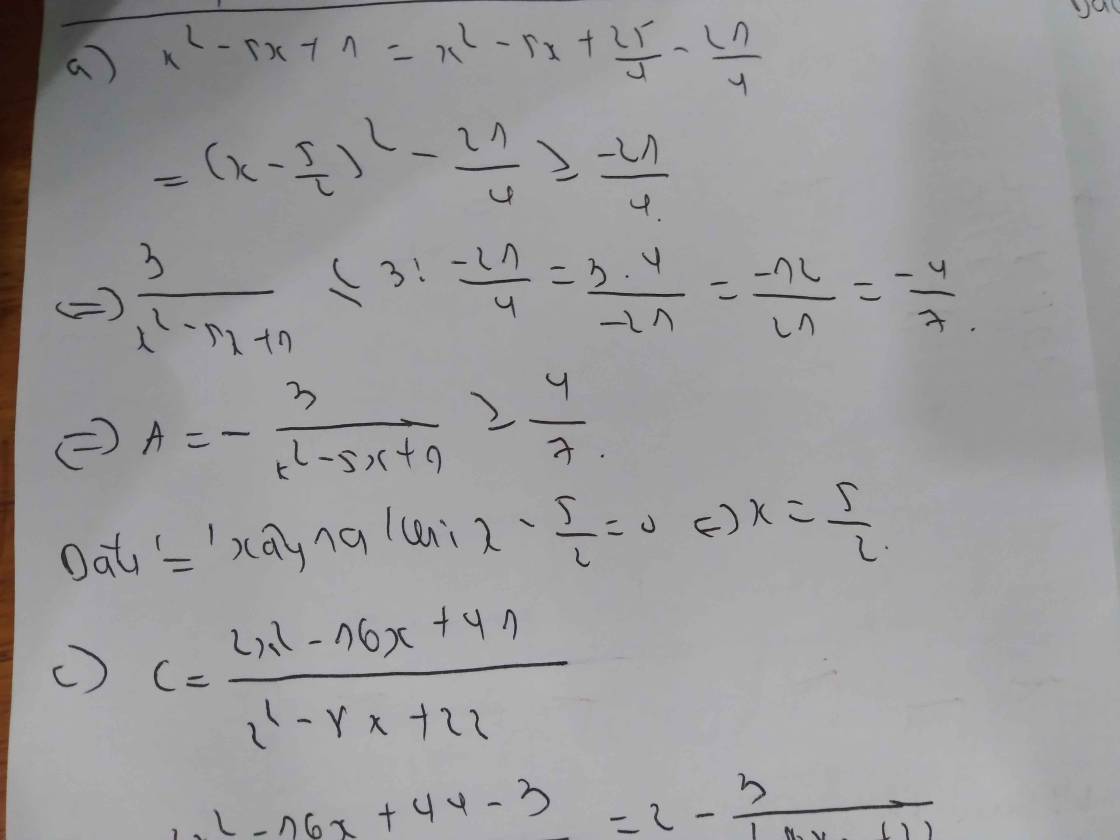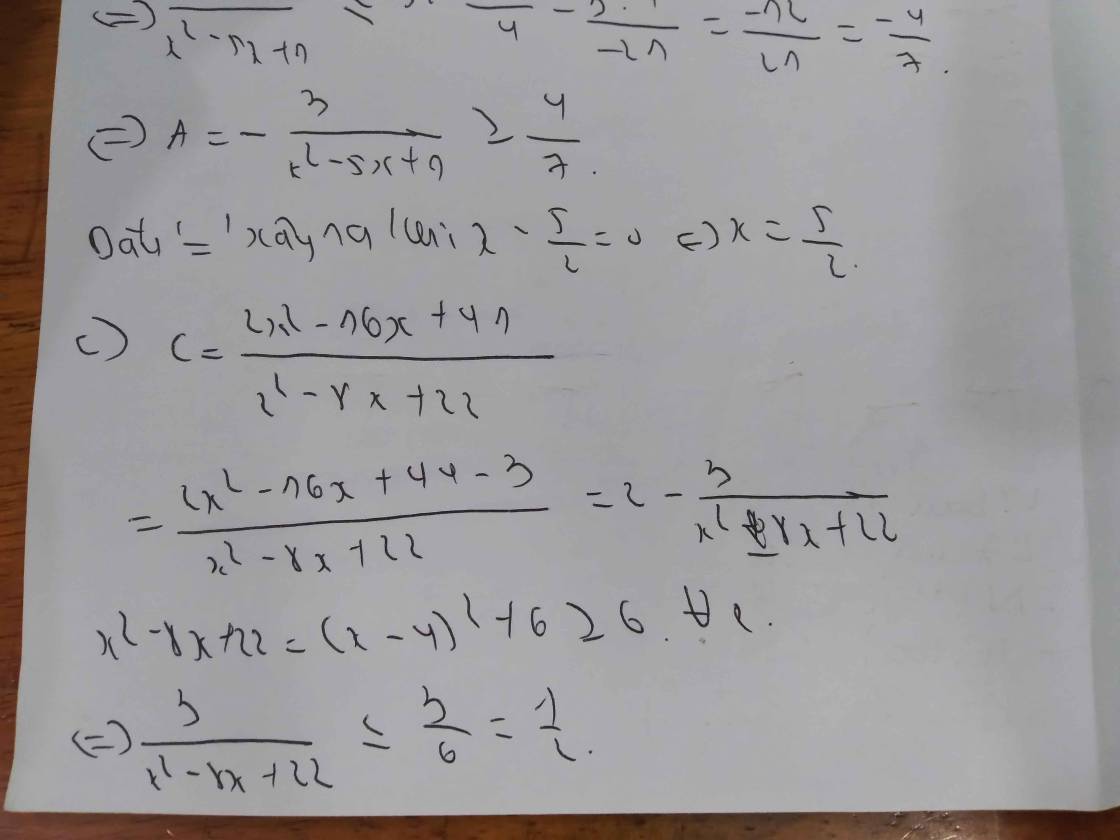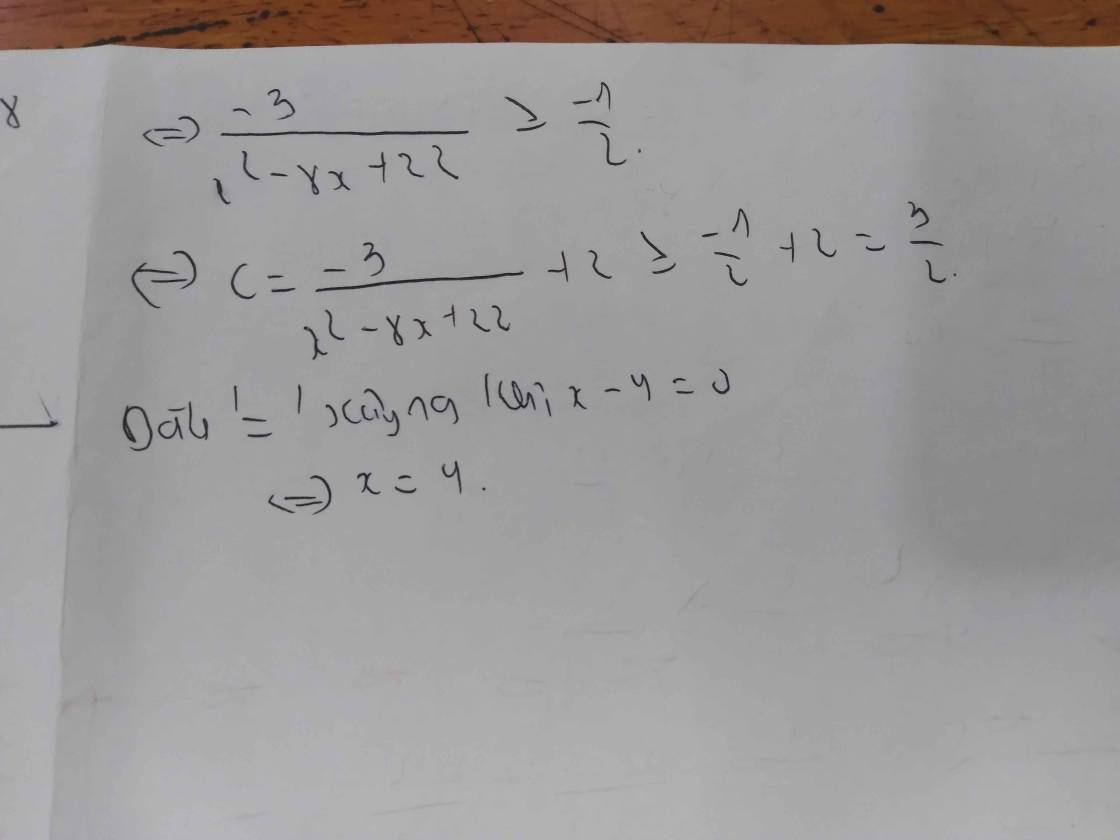tìm giá trị nhỏ nhất của biểu thức:
A=(2x-1)4+3
B=-(8x-\(\dfrac{4}{5}\))6+1
NL
Những câu hỏi liên quan
Với x là số thực,tìm giá trị nhỏ nhất của các biểu thức sau:
1, A = 2x^2 - 8x + 1
2, B = x^2 + 3x + 2
3, C = 4x^2 - 8x
4, D = \(\dfrac{1}{5−x^2−2x}\)
\(A=2\left(x^2-4x+4\right)-7=2\left(x-2\right)^2-7\ge-7\)
Dấu \("="\Leftrightarrow x=2\)
\(B=\left(x^2+3x+\dfrac{9}{4}\right)-\dfrac{1}{4}=\left(x+\dfrac{3}{2}\right)^2-\dfrac{1}{4}\ge-\dfrac{1}{4}\)
Dấu \("="\Leftrightarrow x=-\dfrac{3}{2}\)
\(C=4\left(x^2-2x+1\right)-4=4\left(x-1\right)^2-4\ge-4\)
Dấu \("="\Leftrightarrow x=1\)
\(D=\dfrac{1}{-\left(x^2+2x+1\right)+6}=\dfrac{1}{-\left(x+1\right)^2+6}\ge\dfrac{1}{6}\)
Dấu \("="\Leftrightarrow x=-1\)
Đúng 2
Bình luận (1)
\(A=2\left(x^2-4x+4\right)-7=2\left(x-2\right)^2-7\ge-7\)
\(A_{min}=-7\) khi \(x=2\)
\(B=\left(x^2+3x+\dfrac{9}{4}\right)-\dfrac{1}{4}=\left(x+\dfrac{3}{2}\right)^2-\dfrac{1}{4}\ge-\dfrac{1}{4}\)
\(B_{min}=-\dfrac{1}{4}\) khi \(x=-\dfrac{3}{2}\)
\(C=4\left(x^2-2x+1\right)-4=4\left(x-1\right)^2-4\ge-4\)
\(C_{min}=-4\) khi \(x=1\)
Biểu thức D không tồn tại cả max lẫn min
Đúng 1
Bình luận (2)
1.
$A=2x^2-8x+1=2(x^2-4x+4)-7=2(x-2)^2-7$
Vì $(x-2)^2\geq 0$ với mọi $x\in\mathbb{R}$
$\Rightarrow A\geq 2.0-7=-7$
Vậy $A_{\min}=-7$ khi $x-2=0\Leftrightarrow x=2$
2.
$B=x^2+3x+2=(x^2+3x+1,5^2)-0,25=(x+1,5)^2-0,25\geq 0-0,25=-0,25$
Vậy $B_{\min}=-0,25$ khi $x=-1,5$
3.
$C=4x^2-8x=(4x^2-8x+4)-4=(2x-2)^2-4\geq 0-4=-4$
Vậy $C_{\min}=-4$ khi $2x-2=0\Leftrightarrow x=1$
4. Để $D_{\min}$ thì $5-x^2-2x$ là số thực âm lớn nhất
Mà không tồn tại số thực âm lớn nhất nên không tồn tại $x$ để $D_{\min}$
Đúng 1
Bình luận (2)
Với x là số thực,tìm giá trị nhỏ nhất của các biểu thức sau:
1, A = 2x^2 - 8x + 1
2, B = x^2 + 3x + 2
3, C = 4x^2 - 8x
4, D = \(\dfrac{1}{5-x^2-2x}\)
A\(=2x^2-8x+1\)
=2x(x-4)+1≥1
Min A=1 ⇔x=4
B=\(x^2+3x+2\)
\(=\left(x^2+2.x.\dfrac{3}{2}+\dfrac{9}{4}\right)-\dfrac{1}{4}\)
\(=\left(x+\dfrac{3}{2}\right)^2-\dfrac{1}{4}\)≥\(-\dfrac{1}{4}\)
Min B=-1/4⇔x=-3/2
Đúng 2
Bình luận (2)
C=\(4x^2-8x\)
=\(\left(\left(2x\right)^2-2x.4+16\right)-16\)
=(2x-4)^2 -16≥-16
Min C=-16 ⇔x=2
Đúng 2
Bình luận (0)
D=\(\dfrac{1}{-\left(x^2-2x+1\right)+6}\)
=\(\dfrac{1}{-\left(x-1\right)^2+6}\)≥\(\dfrac{1}{6}\)
Min D=1/6 ⇔x=1
Đúng 2
Bình luận (1)
Tìm giá trị nhỏ nhất hoặc lớn nhất của các biểu thức sau
a) A= \(\dfrac{-3}{x^2-5x+1}\)
b) B=\(\dfrac{2x^2+4x+4}{x^2}\)
c) C= \(\dfrac{2x^2-16x+41}{x^2-8x+22}\)
Tìm giá trị lớn nhất hoặc giá trị nhỏ nhất của các biểu thức sau:
a) S= \(\dfrac{3}{2x^2+2x+3}\)
b) T= \(\dfrac{5}{3x^2+4x+15}\)
c) V= \(\dfrac{1}{-x^2+2x-2}\)
d) X= \(\dfrac{2}{-4x^2+8x-5}\)
Với x là số thực,tìm giá trị nhỏ nhất của các biểu thức sau:
1, A = 2x^2 + 4x + 1
2, B = 3x - x^2 + 4
3, C = 8x - 4x^2
4, D = \(\dfrac{1}{4x^2-4x+5}\)
HELPPPPP Me T.T
\(A=2x^2+4x+1=2\left(x^2+2x+1\right)-1=2\left(x+1\right)^2-1\ge-1\)
\(A_{min}=-1\) khi \(x=-1\)
Câu B chỉ có max, ko có min
\(B=-x^2+3x+4=-\left(x^2-3x+\dfrac{9}{4}\right)+\dfrac{25}{4}=-\left(x-\dfrac{3}{2}\right)^2+\dfrac{25}{4}\le\dfrac{25}{4}\)
\(B_{max}=\dfrac{25}{4}\) khi \(x=\dfrac{3}{2}\)
Câu C cũng chỉ có max, không có min
\(C=-4x^2+8x=-4\left(x^2-2x+1\right)+4=-4\left(x-1\right)^2+4\le4\)
\(C_{max}=4\) khi \(x=1\)
Câu D cũng chỉ có max, không có min
\(D=\dfrac{3}{4x^2-4x+1+4}=\dfrac{3}{\left(2x-1\right)^2+4}\le\dfrac{3}{4}\)
\(C_{max}=\dfrac{3}{4}\) khi \(x=\dfrac{1}{2}\)
(4 câu có 3 câu sai đề)
Đúng 1
Bình luận (5)
a) Tìm x sao cho giá trị biểu thức dfrac{3x-2}{4}không nhỏ hơn giá trị của biểu thức dfrac{3x+3}{6}b) Tìm x sao cho giá trị của biểu thức (x+1)2 nhỏ hơn giá trị của biểu thức (x-1)2.c) Tìm x sao cho giá trị của biểu thức dfrac{2x-3}{35}+dfrac{xleft(x-2right)}{7} không lớn hơn giá trị của biểu thức dfrac{x^2}{7}-dfrac{2x-3}{5}
Đọc tiếp
a) Tìm x sao cho giá trị biểu thức \(\dfrac{3x-2}{4}\)không nhỏ hơn giá trị của biểu thức \(\dfrac{3x+3}{6}\)
b) Tìm x sao cho giá trị của biểu thức (x+1)2 nhỏ hơn giá trị của biểu thức (x-1)2.
c) Tìm x sao cho giá trị của biểu thức \(\dfrac{2x-3}{35}+\dfrac{x\left(x-2\right)}{7}\) không lớn hơn giá trị của biểu thức \(\dfrac{x^2}{7}-\dfrac{2x-3}{5}\)
a: Để \(\dfrac{3x-2}{4}\) không nhỏ hơn \(\dfrac{3x+3}{6}\) thì \(\dfrac{3x-2}{4}>=\dfrac{3x+3}{6}\)
=>\(\dfrac{6\left(3x-2\right)}{24}>=\dfrac{4\left(3x+3\right)}{24}\)
=>18x-12>=12x+12
=>6x>=24
=>x>=4
b: Để \(\left(x+1\right)^2\) nhỏ hơn \(\left(x-1\right)^2\) thì \(\left(x+1\right)^2< \left(x-1\right)^2\)
=>\(x^2+2x+1< x^2-2x+1\)
=>4x<0
=>x<0
c: Để \(\dfrac{2x-3}{35}+\dfrac{x\left(x-2\right)}{7}\) không lớn hơn \(\dfrac{x^2}{7}-\dfrac{2x-3}{5}\) thì
\(\dfrac{2x-3}{35}+\dfrac{x\left(x-2\right)}{7}< =\dfrac{x^2}{7}-\dfrac{2x-3}{5}\)
=>\(\dfrac{2x-3+5x\left(x-2\right)}{35}< =\dfrac{5x^2-7\cdot\left(2x-3\right)}{35}\)
=>\(2x-3+5x^2-10x< =5x^2-14x+21\)
=>-8x-3<=-14x+21
=>6x<=24
=>x<=4
Đúng 0
Bình luận (0)
Tìm giá trị nhỏ nhất của các biểu thức sauAx^2-4x+1 B4x^2+4x+11 Cleft(x-1right)left(x+3right)left(x+2right)left(x+6right)D2x^2+y^2-2xy+2x-4y+9 Tìm giá trị lớn nhất của các biểu thức sauE5-8x-x^2F4x-x^2+1
Đọc tiếp
Tìm giá trị nhỏ nhất của các biểu thức sau
A=\(x^2-4x+1\) \(B=4x^2+4x+11\)
\(C=\left(x-1\right)\left(x+3\right)\left(x+2\right)\left(x+6\right)\)
\(D=2x^2+y^2-2xy+2x-4y+9\)
Tìm giá trị lớn nhất của các biểu thức sau
\(E=5-8x-x^2\)
\(F=4x-x^2+1\)
a) Tìm giá trị nhỏ nhất của biểu thức: S= \(\dfrac{5x^4+4x^2+10}{x^4+2}\)
b) Tìm giá trị lớn nhất của biểu thức: T=\(\dfrac{2x^4-4x^2+8}{x^4+4}\)
c) Cho a là hằng số và a>0. Tìm giá trị nhỏ nhất của biểu thức: M=\(\dfrac{8y^8+2a\left(y-3\right)^2+2a^2}{4y^8+a^2}\)
Bài 1: Tìm giá trị nhỏ nhất của mỗi biểu thức sau:
\(A=\)\(x^2+4\) \(B=\)\(2x^2-\dfrac{3}{2}\) \(C=\)\(\left(2x-3\right)^2-5\)
1) \(A=x^2+4\ge4\)
\(ĐTXR\Leftrightarrow x=0\)
2) \(B=2x^2-\dfrac{3}{2}\ge-\dfrac{3}{2}\)
\(ĐTXR\Leftrightarrow x=0\)
3) \(\left(2x-3\right)^2-5\ge-5\)
\(ĐTXR\Leftrightarrow x=\dfrac{3}{2}\)
Đúng 1
Bình luận (0)









